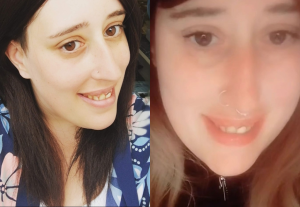

Apparently it was all in my head
Tammy went through lots of tests and people telling her that symptoms were phycological before she finally got her diagnosis of eosinophilic gastroenteritis.
So I’m suffering almost every day at the ages between 20-24 years old, having to be given IV morphine to help the severe pain in my abdomen. If I wasn’t at the hospital I was going back and forth to my GP surgery.
After several visits to the GP and after tests I was told it was IBS and then I was told it was phycological. When I had a massive stomach, constant diarrhoea and so much pain, I don’t know how they could have even suggested it was all in my head right!
I was always working and trying to study as much as I could but the pain was getting so intense it was affecting my work. As well as everything going on with my symptoms, it was around this time that my dad also became ill with lung cancer. With everything going on, I continued to try my best to work, study, help look after my dad and get on with daily life .
What more would a girl want?
I was definitely living the dream at this point (I hope you can tell that was sarcasm!). I was having to undertake gruelling tests and procedures at the hospital. I was in constant pain and no one could understand why. Doctors would tell me that the tests were coming back ‘normal’. They continued to keep me in hospital and refused to discharge me.
Finally after around 1 year of hospital admissions doctors put it down to Crohn’s disease. However after more investigations they diagnosed me with a rare condition called eosinophilic gastroenteritis which is genetic. Some of my other family members have this .
Fast forward 12 years after diagnosis, my health is better and more controlled but I’m on a lot of medication and due to this being an autoimmune disease I catch infection quickly. And due to the nature of this condition it can make me poorly, so a lot of my life is affected. I am grateful to some of the doctors and professionals along the way, however there have been not-so-good ones too, who seemed to have no compassion. Looking back, I still struggle to understand why they wanted to work in the care sector.
I’m sharing my blog with you to mainly inspire others to listen to their own body and if you are not getting the correct help, don’t suffer in silence. Remember that you know your own body!

Donate today
to help us bring the voices of the rare and genetic community to legislation and healthcare policy.
